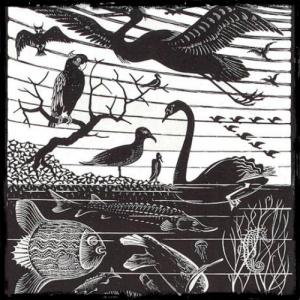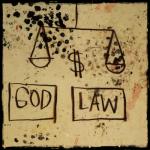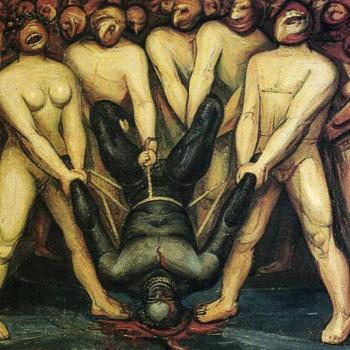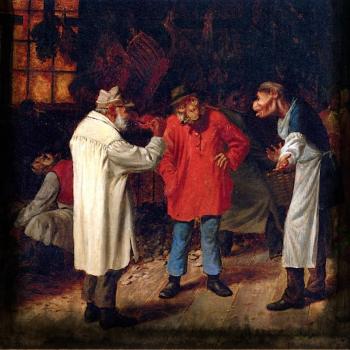
The premise of The Creation Project is that we will never understand and address the cognitive and existential dread the Donald Trump phenomenon has unleashed by merely parsing the man or the immediate circumstances surrounding his election and its aftermath.
In a period marked by the unprecedented unraveling of the geological and biological premises of our existence, normal political talking points, policy wonkery, and electoral shenanigans are not sufficient tools for the job. To understand this cultural and political inversion, and to grasp the sources of our emotional dislocation, we must travel deep into Western thought and engage a broad sweep of Western history.
The Creation Project thus takes as its starting point an irony. We need to filter the political impact and significance of Donald Trump, (a crude and simple man), and “Make America Great Again” (a crude and simple concept) by embracing new frontiers on thought and action that emerging theories and studies of complexity science and of complex systems have made available to us. The Creation Project seeks to apply this emerging literature on complexity to the ways in which we think about, inhabit, imagine, and use “history,” those grand narratives we create to explain and justify ourselves.
Natural Law and Donald Trump
Following the 2016 presidential election, I wrote a series of essays that probed the rising influence of an intellectually sophisticated and aggressively conservative Catholic cohort in American politics, with a range that extended from court jester Antonin Scalia to political arsonist Steve Bannon to philosopher-muse Robby George. The premise of many of these essays was that our historical moment’s revanchist political conservatism – in the United States and in Europe – derives directly and without equivocation from Catholic-influenced conceptions of natural law.
The Aristotelian philosophical foundations of natural law are politically neutral, and can be explored, debated, adjusted, refined, and refuted on their merits. However, the religious spin on natural law ideas in the current political environment – the belief that Creator-centric Biblical revelation frames and determines content and the outcomes of these “laws of nature” – is not politically neutral and is, in fact, intensely agenda-driven.
To the degree that natural law cloaks and obscures this underlying Biblical agenda, its political and philosophical influence have in recent decades served profoundly counterproductive and destructive ends.
A Hyper-Conservative Republican Sea Monster
As Jane Mayer and others have documented, the Tea Party, bomb-throwing wing of the Republican Party did not magically seize power. Donald Trump’s election is only the latest – if most surreal – chapter of a slow-motion, half-century political creep on to land of a hyper-conservative Republican sea monster,.
Let’s consider the beast an inflected version of the Deep State that leverages the ideas and arguments of conservative Catholic intellectuals alongside the influence of market, cultural, and legal fundamentalists. With specific impacts from canonically minded American judges on the federal bench, and their sponsors at well-funded advocacy organizations such as the Heritage Foundation, Federalist Society, and Judicial Crisis Network.
Indeed, far from subsisting as a beleaguered fringe in the Siberian wastelands of the academy, as they would like us to believe, intellectual proponents of Catholic natural law and moral philosophy are engaged, well-funded, and firmly in control of the public lexicon on the most critical and fraught policy debates of our moment in time, including conversations about:
- the global “clash of civilizations”;
- the underlying meaning of terms such as “human dignity” and “unalienable rights”;
- what it means to serve “the least among us”; and
- the fraught intersection between human sexuality and human conception.
Interestingly, evangelical Protestantism – philosophically primitive, politically shallow, and explicitly stuck in the Biblical wilderness – remains largely irrelevant to this conversation. For the dominant constituents of the American conservative movement (tuned to the smash-mouth, Irish-Catholic Steve Bannon frequency), ideas are the tool that claims for us, not grace or justification, but power, the zero-sum, terrestrial control of both bodies and minds.
Existential Risk Requires Existential Thinking
But here’s the concern. When it comes to anthropogenic climate change, breaching inequality, toxically “illiberal” nationalism, and generational abandonment – we have unhinged ourselves and crossed a global point of no return that half-measures cannot address. Unfortunately, for the most part the scale of our thinking on these matters does not even approximately match the scale of our risk.
Of course, it is tempting – given the scale of the problem and of the potential harm, and the general uncertainty of the causation – to minimize or dismiss these concerns. To wish them away, or to imagine the harm will come to others and not to oneself. But the direction is clear, and the wager is entirely on the order of Pascal’s.
We need a robust, coherent framework for assessing the meaning of those distressing events or moments that unleash Donald Trump as that gallivanting, howling beast in our heads. Like a prophetic monstrosity from a Cormac McCarthy novel, we must scale the deviance of this single man, whom we have ourselves uplifted, to the dark singularity of the times and act accordingly.
Historical moments at the far end of this scale of risk – let’s call them extinction moments, radical disruptions beyond the scope of even the proverbial Black Swan, on a scale outside of human time and memory – require us to peel back vast slices of the past, lay bare the ground of our being as a species, and rebuild upon that purled soil. The most profound extinction moment, of course, would be extinction by our own hand of life on the planet as we know it.
The Big Think: Revealed Religion, Natural Law, and Western Civilization
Such extinction moments require us, with all the mental strength we can muster, to consciously look past the emotionally comfortable and familiar rituals of our minds, past problem-solving heuristics that work well enough in “normal” times, past nearly everything we regard as a given in our lives. For the next year, my intention is to do some extinction-appropriate purling, to scale my own thinking to the level of risk and challenge we face in the world.
With this goal in mind, The Creation Project will examine how the Catholic philosophy of natural law has intersected and sustained the very idea of “Western Civilization.” The defense of this idea – that the West represents the highest and most profound expression of a Christian God’s scrivened plan for the human species created in his image – buttresses and justifies and provides political cover for nearly every significant moment and movement of European and American history in the past millennium.
The Creation Project will explore and confront (immodestly, because we live in immodest times) layered, nested relationships between:
- Enlightenment conceptions of individuality, selfhood, agency, rationality, causation, and morality;
- Medieval premises of Thomist natural law and Catholic human dignity theology; and
- Primitive Christian religious beliefs founded on revelation and preserved via the fetish of the text.
By definition, the foundations of revealed religions are textually arbitrary, fragmented, and evanescent, and so in times of strife wholly inadequate as a basis for holding together societies under stress and at risk. The most pivotal argument of The Creation Project, then, will be that peeling back our past tells us that Abrahamic revealed religion – specifically Judaism, Christianity, and Islam – is the major obstacle obscuring our ability to grasp basic realities of our existence and blocking our capacity to address contemporary challenges to our existence.
Worship the Creation, Not the Creator
The alternative to Abrahamic revealed religion is simple enough. First, we do not need to worship an arbitrary, entirely preposterous concept of a Creator (himself created in our own inadequate human image). We need not base our thoughts and deeds on the flat, toneless, scriptural archaicisms we imagine to be representations of his will. Second, we can and must instead turn our attention to revealed truths that are far more “self-evident” and miraculous, the truths enfolded within the body of the earth, which is the Creation itself.
Of course, this “simple alternative” – to worship the Creation, not the Creator – requires from us nothing short of a collective cognitive epiphany that frees us to more fully appreciate the insights that post-Newtonian science offer us, regarding the layered, interlaced trellises that sustain life, the hidden movements that captured by concepts such as:
- uncertainty, randomness, probability, and stochastic processes that govern evolution;
- emergent morphologies, phase transitions, and fractal recursions that characterize complex physical, chemical, and biological systems;
- communication networks and information pathways that encode self-organizing systems and hive behavior; and, most poignantly,
- the curse of entropy – the relationships between fallibility and failure, resilience and endurance, death and life.
We can certainly sum these concepts as the miracle of Creation. We might assume that natural law philosophies would acknowledge and honor these hidden, yet magnificent, laws of nature, which is to some degree the case with the classical version of the philosophy of natural law associated with Aristotle.
However, the contemporary Catholic focus on a Creator-centric natural law cannot quit Biblically derived linear causation models that impel us back toward destructive creator-created and subject-object binaries. At the point we can finally abandon this linear causation logic, we can more fully and directly experience this Creation miracle immanent within nature itself, and better understand our place within it, and the interconnectedness that transcends the agency of any individual or any species.












